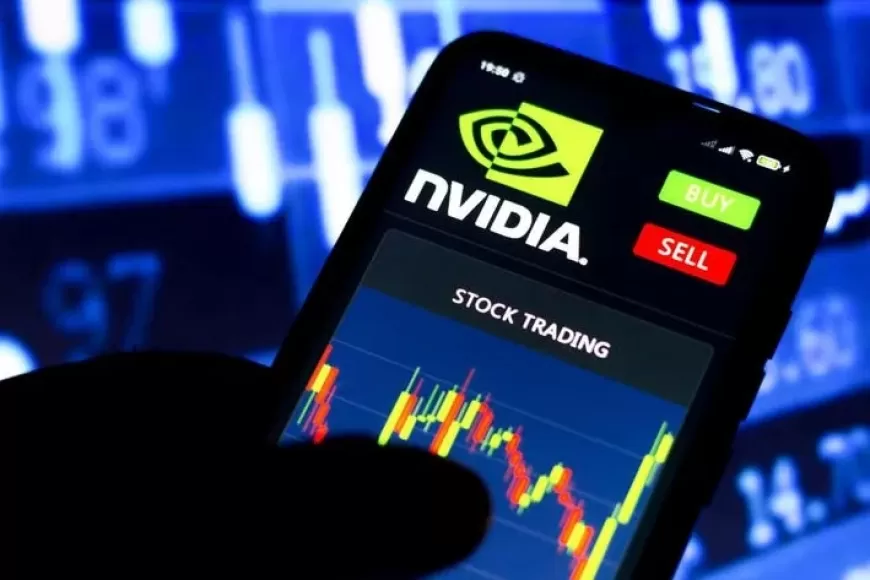Nvidia Stock Soars on Strong AI-Driven Sales Forecast
AI Boom Fuels Nvidia's Impressive Financial Performance and Market Valuation

Nvidia Corp., a leading chipmaker in the artificial intelligence (AI) sector, saw a significant rise in its stock price on Thursday following a positive sales forecast that highlighted robust spending on AI computing. The company announced that its second-quarter revenue is expected to be around $28 billion, surpassing analysts' expectations of $26.8 billion. Additionally, Nvidia's first-quarter results, which ended April 28, exceeded projections thanks to the strong performance of its data-center division.
Market Reaction and Financial Performance
Heading into the earnings report, there was considerable speculation about whether Nvidia's latest financial figures would justify the substantial increase in its stock price, which had surged 108% this year by Wednesday's close. The company's report did not disappoint investors, with shares jumping by as much as 9.2% to $1,036.76 on Thursday. This increase added approximately $217 billion to Nvidia's market value, surpassing the entire market capitalization of Intel Corp., a competitor that once overshadowed Nvidia in many respects. Nvidia's projected quarterly sales of $28 billion are more than double what Intel is expected to report.
Company Announcements and Industry Impact
In addition to the earnings news, Nvidia announced a 10-for-1 stock split and increased its quarterly dividend by 150% to 10 cents per share. The positive outlook for Nvidia also buoyed the shares of other AI-related companies, including Super Micro Computer Inc., Advanced Micro Devices Inc., and Dell Technologies Inc.
Nvidia's success underscores its position as the leading beneficiary of AI-related spending. The company's AI accelerators, which are specialized chips designed to support data centers in developing advanced tools like chatbots, have seen a surge in demand over the past two years. This demand has driven Nvidia's sales and significantly boosted its market valuation, which now exceeds $2.3 trillion.
Revenue Breakdown and Market Strategy
In the fiscal first quarter, Nvidia's revenue more than tripled to $26 billion, with adjusted earnings per share reaching $6.12. Analysts had predicted revenues of approximately $24.7 billion and earnings of $5.65 per share. Nvidia's data-center division generated $22.6 billion in revenue last quarter, while gaming chips contributed $2.6 billion, meeting analysts' expectations.
CEO Jensen Huang, known for his signature black leather jacket, highlighted the transformative impact of AI, describing it as the beginning of a new industrial revolution. He noted that Nvidia is focused on expanding its customer base beyond the large cloud-computing providers, known as hyperscalers, to include a diverse range of industries such as consumer internet companies, car manufacturers, biotechnology, and healthcare.
Strategic Expansion and Future Prospects
Huang emphasized that AI is spreading to various sectors, including countries developing their own AI systems, referred to as sovereign AI. These expanding markets present multiple billion-dollar opportunities beyond traditional cloud service providers. For instance, Elon Musk's Tesla Inc. is using Nvidia's technology to develop software for self-driving vehicles.
Despite Nvidia's efforts to diversify its customer base, hyperscalers remained a crucial growth driver last quarter, accounting for about 45% of the company's data-center revenue. This suggests that Nvidia is still in the early stages of broadening its market reach.
Nvidia's new chip platform, Blackwell, is now in full production and is designed to support generative AI that can handle trillions of parameters. Huang expressed confidence in the platform, stating that it would drive a significant portion of Nvidia's revenue in 2024. He also noted that demand for Nvidia's existing products remains strong as customers continue to build out their AI infrastructure.
Supply Chain and Production Challenges
The high demand for Nvidia's products has outstripped supply, a situation Huang expects to persist into next year. The increasing complexity of Nvidia's technology, which now includes complete computer systems, has made its supply chain more intricate and challenging to manage. Despite these difficulties, Huang remains optimistic about the company's ability to meet production demands, describing their efforts to manufacture supercomputers at scale as unprecedented.
In summary, Nvidia's strong financial performance and optimistic outlook underscore its central role in the AI revolution. As the company continues to innovate and expand its market presence, it faces both significant opportunities and challenges in maintaining its leadership in the rapidly evolving AI sector.
Also Read: Nvidia's Earnings and Fed Minutes Awaited Amid Wall Street's Record Highs






























































